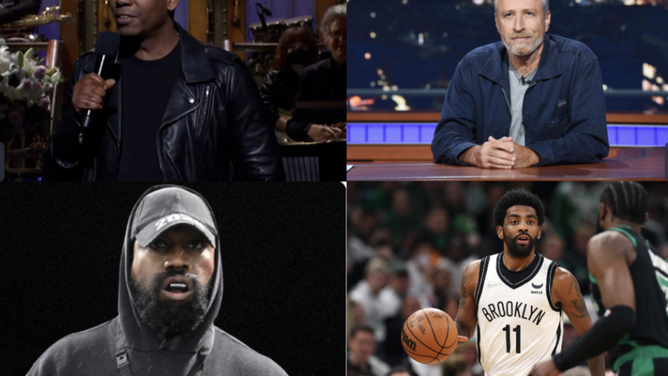Jon Stewart Opposes Censoring, Penalizing Dave Chappelle, Kyrie Irving, And Kanye West
Jon Stewart opposes imposing censorship and penalties on comedian Dave Chappelle, rapper Ye (formerly Kanye West), and Brooklyn Nets guard Kyrie Irving.
Critics have accused Chappelle, Ye, and Chappelle of inciting anti-Semitism.
Ye tweeted that he planned to go "deathcon 3" on a Jewish cabal that he purports to use its influence to undermine him. He has since been the subject of corporate ostracism.
Irving tweeted an Amazon link to the film, "Hebrews to Negroes: Wake Up Black America." The Nets then suspended him for not properly apologizing for posting the link. Nike next severed ties with the basketball star.
Chappelle made jokes about not being able to criticize Jewish people in Hollywood during his appearance on "Saturday Night Live" last weekend. The Anti-Defamation League (ADL) accused the comedian of causing "trauma."
Stewart disagrees with such persecution:
“I don’t believe that censorship and penalties are the way to end anti-Semitism or to not gain understanding. I don’t believe in that. I think it’s the wrong way to approach it,
Stewart took particular issue with the Nets requiring Irving to complete an arbitrary five-step process in order to return to basketball.
"This is a grown-ass man and to say, ‘We’re going to put you in a time out, you’re going to sit in a corner and stare at the wall until you no longer believe the Jews control the international banking system.’ We have to get past this in the country. People think Jews control Hollywood. People think Jews control the banks. And to pretend that they don’t and to not deal with it in a straightforward manner, we’ll never gain any kind of understanding with each other."
Well said. Meanwhile, Amazon continues to profit from the title Irving shared. Currently, "Hebrews to Negroes" is a best-seller on Amazon. The media buried Irving, while Jeff Bezos turned a profit.

Jon Stewart opposes censoring, Dave Chappelle, Kyrie Irving, and Kanye West.
Stewart added that he was more surprised to see Irving's tweet than Ye's comments:
“The Kanye thing… he can be erratic and that didn’t surprise me. The Kyrie thing surprised me a bit — you don’t expect to get it from someone named Irving."
Regarding Chappelle, Stewart told Colbert he agreed that talking about Jews in Hollywood shall not be off limits.
“Dave said something in the SNL monologue that I thought was constructive as well which is ‘It shouldn’t be this hard to talk about things.’ And that is what we’re talking about," Stewart continued.
Jon Stewart is arguing against the adverse effects of policing thoughts. And his fears are valid. We recently stated that the blacklisting of Ye for his thought-crimes is more dangerous than his rhetoric.
You can read the full column below. The following is a snippet:
What’s happening to Ye exceeds censorship. Big Business is using its consolidated power to exile an individual from the marketplace on account of his mere speech. That’s a development far more consequential than what Ye tweets and drivels on various podcasts.
Advocates of throttling Ye dismiss the phenomenon as a one-off, a response to a mentally ill rapper who allowed his right-wing pals to radicalize him. Perhaps to the general public, the destruction of Ye is, in fact, a one-off response to anti-Semitism.
But it’s much more than that to the people in charge. The dismantling of his brand has vastly empowered business leaders. It has uncovered the potential stranglehold Big Business could wield over discourse in the country, one that mirrors the advent of internet censorship.
The answer to hate speech is not less speech. The answer to hate speech is more speech — not an empowered class of bureaucrats browbeating individuals into groupthink.
That's the point in which Jon Stewart attempts to make.
Penalizing someone for their thoughts doesn't create a better understanding. It only validates their suspicions that there is a concerted effort to muzzle dissenting voices.
"I’m afraid that the general tenor of conversation in this country is cover it up, bury it, put it to the outskirts and don’t deal with it," Jon Stewart concluded.